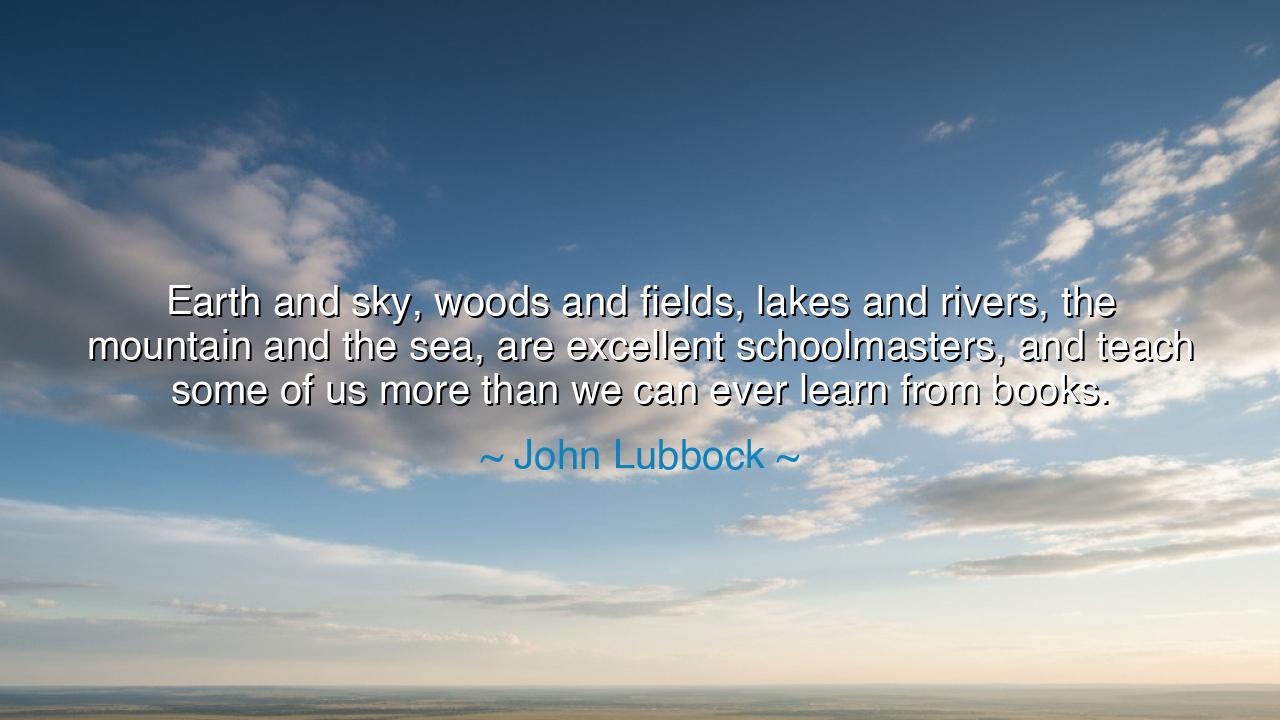
Earth and sky, woods and fields, lakes and rivers, the mountain
Earth and sky, woods and fields, lakes and rivers, the mountain and the sea, are excellent schoolmasters, and teach some of us more than we can ever learn from books.






John Lubbock, statesman, naturalist, and friend to both science and humanity, once wrote: “Earth and sky, woods and fields, lakes and rivers, the mountain and the sea, are excellent schoolmasters, and teach some of us more than we can ever learn from books.” In these words resounds a truth as ancient as the world itself: that the greatest teachers are not always found in halls of stone, nor bound in pages, but in the living creation around us. To walk among mountains, to gaze upon the sky, to hear the sea is to enter a classroom older than man and richer than any library.
The origin of this thought lies in Lubbock’s life as a naturalist during the 19th century, when industry and modernity often threatened to pull people away from the rhythms of the land. He sought to remind his fellow men that wisdom was not found only in scholars’ debates, but in the silent language of the woods and the song of the rivers. Nature was, to him, a vast and patient schoolmaster, imparting lessons of beauty, humility, endurance, and balance to those who would pause long enough to listen.
Consider the story of Henry David Thoreau, who withdrew to Walden Pond to learn directly from earth and sky. There he discovered truths that no lecture hall could offer: the joy of simplicity, the futility of endless striving, the sacredness of time. His journals became books that later generations read, but those books were themselves children of nature’s teaching. Thoreau did not invent wisdom; he received it from woods, fields, and waters, just as Lubbock said.
The ancients, too, knew this secret. The Stoic philosophers declared that to live in accordance with nature was to live in accordance with reason itself. The psalmists of Israel lifted their eyes to the mountains and declared them symbols of strength and faith. Indigenous peoples across the earth regarded the earth and the sky not as mute matter, but as elders, instructing them in the cycles of life, the virtues of patience, the need for reverence. All bore witness to what Lubbock put into words: nature is a living schoolhouse, teaching those with hearts open to its lessons.
But why is it so? Because the mountain teaches endurance, the river teaches persistence, the sea teaches both power and humility. The sky opens the imagination, the woods whisper of patience, the fields reveal the mystery of growth and harvest. Each thing is both itself and a mirror of deeper truths. A man who watches the eagle learns of vision. A woman who plants seeds learns of faith. These are not lessons written in books alone, but truths impressed upon the soul by the living world.
Yet Lubbock does not dismiss books, nor the wisdom of human learning. Rather, he reminds us that without nature, our learning is incomplete. A book can tell of rivers, but only standing on its bank, hearing the rush of water, feeling its spray, does one understand its life. A book can describe a storm, but only when thunder rolls above and lightning splits the sky does the heart learn awe. The marriage of the written word and the living world completes the education of the soul.
The lesson for us is this: seek your schoolmasters in the wild as well as in the library. Read, yes, but also walk. Study, yes, but also listen. Do not imagine wisdom is confined to paper; it is written in the earth, in the clouds, in the song of the bird at dawn. Let nature tutor your patience, strengthen your humility, and awaken your wonder.
So let John Lubbock’s words echo as a command for future generations: “Earth and sky, woods and fields, lakes and rivers, the mountain and the sea, are excellent schoolmasters.” Do not be blind to these teachers. For if you walk with open eyes and listening heart, you will find that the world itself is a book — written not in ink, but in stars and stones, rivers and winds — a book that never ends and never ceases to speak.






AAdministratorAdministrator
Welcome, honored guests. Please leave a comment, we will respond soon